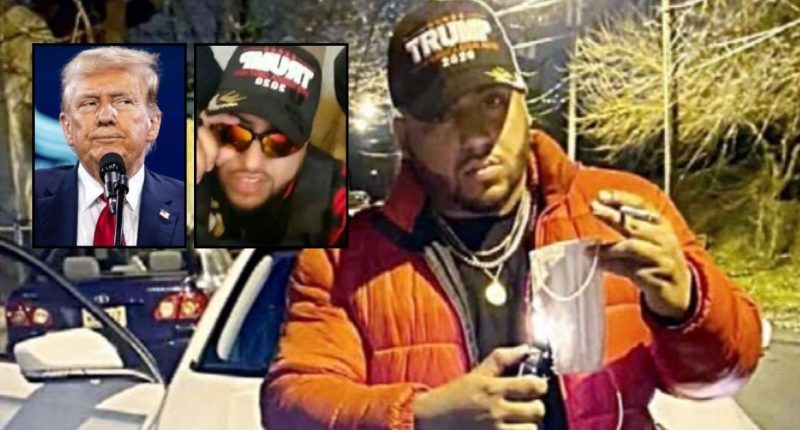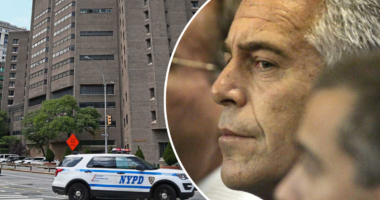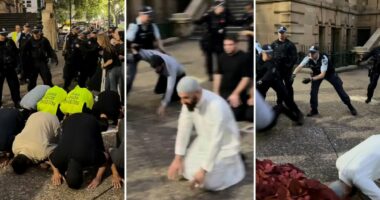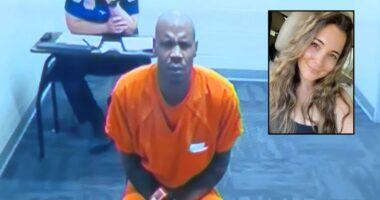Share this @internewscast.com
Background: Hector Vargos Santos (Justice Department). Left inset: Donald Trump speaking at the annual Road to Majority conference in Washington, DC, in June 2024 (Allison Bailey/NurPhoto via AP). Right inset: A selfie that Hector Vargas Santos allegedly took inside the U.S. Capitol during the January 6 Capitol attack (DOJ).
A former U.S. Marine and pardoned January 6 defendant, who attempted to reclaim the fines and restitution he paid following his conviction for involvement in the Capitol riot, faced rejection on Friday by a federal judge. The judge clarified that a pardon doesn’t void a person’s conviction or monetary penalties, thus no refunds are due.
“As the Supreme Court clarified in Knote, once a conviction has been ‘established by judicial proceedings,’ any penalties imposed are ‘presumed to have been rightfully done and justly suffered,’ despite the defendant later receiving a pardon,” wrote U.S. District Judge Randolph Moss in a nine-page order concerning Hector Vargas Santos, 29, from Jersey City, New Jersey.
Trump’s mass pardon of Jan. 6 rioters recognized Santos as one of more than 1,500 defendants who were granted clemency after the president took office for a second time in January.
In his order Friday, Moss cited the U.S. Supreme Court decision in Knote v. United States, which described a pardon as “an act of grace” that does not restore “rights or property once vested in others in consequence of the conviction and judgment,” per the 1877 ruling. “Because Santos’ payments were collected while his convictions were ‘in force,’ id., the funds were not ‘erroneously collected’ and are therefore not refundable,” said Moss, a Barack Obama appointee.
Santos was convicted in 2023 of four misdemeanors after he “forced his way into the Capitol building and Rotunda with a crowd of rioters,” according to Moss. “Santos was one of thousands who descended upon the Capitol that day, but he was one of the first individuals to breach the restricted Capitol grounds,” the judge said. “Santos and his fellow rioters caused substantial physical damage to the Capitol, requiring the expenditure of more than $2.8 million for repairs.”
Love true crime? Sign up for our newsletter, The Law&Crime Docket, to get the latest real-life crime stories delivered right to your inbox.
As a result, Santos was ordered to pay a $70 mandatory special assessment, $500 in restitution to the Architect of the Capitol and a $2,500 fine. He paid a total of $2,026.19 before being pardoned by President Donald Trump earlier this year, including $1,456.19 towards the $2,500 fine.
“In accordance with its usual protocol, the Finance Office for the District Court collected these funds and deposited them into the Crime Victims Restitution Fund within the United States Treasury,” Moss said Friday. “After the court dismissed his case, Vargas submitted a request to the Finance Office for a refund of his payments, but the Office responded that it was unable to issue a refund.”
Moss noted how the finance office also cited Knote v. United States in its official response, with Santos moving to try and get a refund of his payments soon after. The Justice Department came out in support of Santos’ request, filing a response of its own that said the Trump administration agrees that Vargas’s payments should be refunded.
Both the DOJ and Santos cited the Supreme Court’s 2017 decision in Nelson v. Colorado, which found that convictions vacated on appeal — Santos was pardoned in January while he had an appeal pending — are “entitled to a return of fines, fees, and restitution.”
Moss wrote that what makes that case differ from Santos is that it did not involve the issuance of a pardon. “Nelson had nothing to do with the scope of the pardon power,” he said.
“Rather, it held that vacatur of a conviction presumptively entitles a defendant to a refund of her payments into the state’s coffers,” the judge explained. “The court’s power to order a refund does not turn on whether a defendant’s conviction was vacated or not; it turns on whether the defendant is entitled to funds that were deposited into the U.S. Treasury before the pardon was granted. As Knote made clear, a pardoned individual is not ‘entitle[d]’ to payments that have already been deposited into the United States Treasury, absent congressional authorization to withdraw the funds.”

















